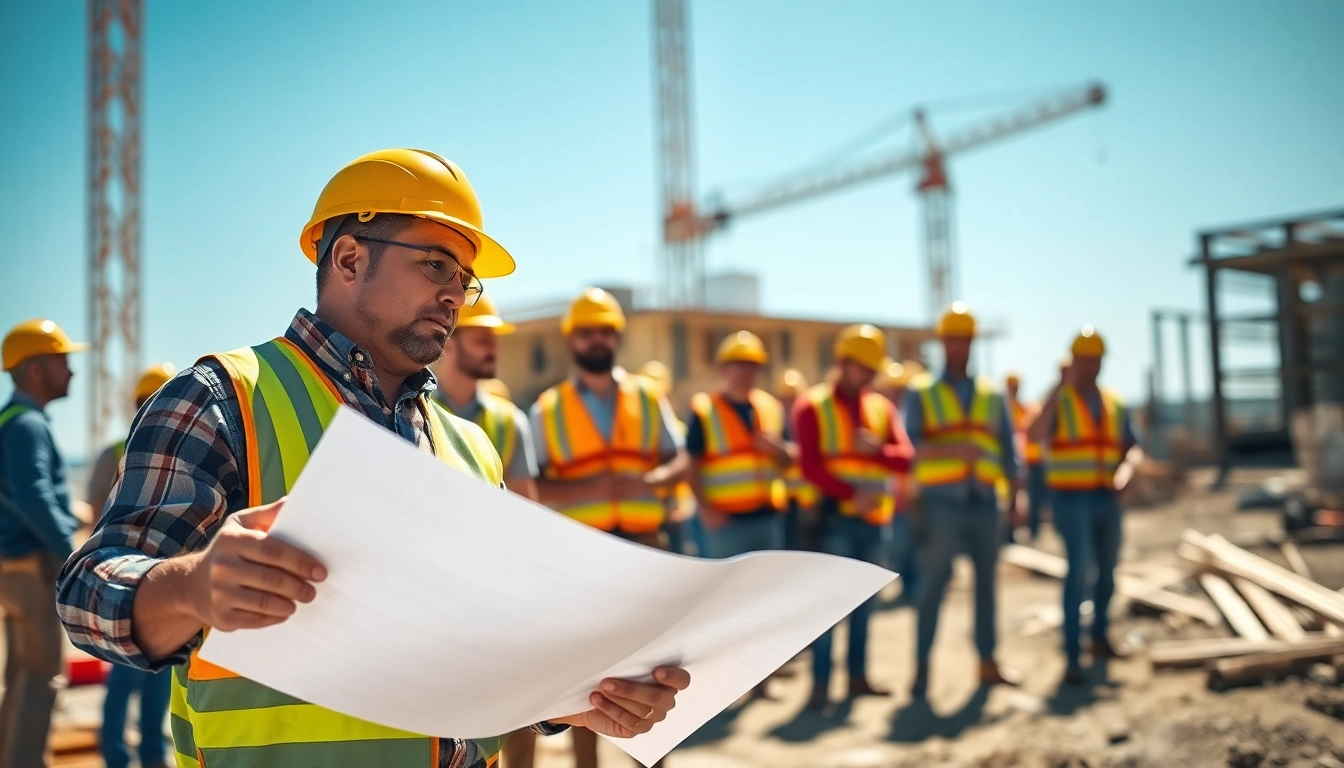
Understanding the Role of a New York Commercial General Contractor
In the bustling landscape of New York City, a reliable partner is critical for the successful execution of any commercial construction project. The New York Commercial General Contractor serves as the backbone of this process, overseeing all aspects of construction from inception to completion. Understanding this role is key for business owners and developers alike, ensuring that their projects are in competent hands.
What Does a New York Commercial General Contractor Do?
A New York Commercial General Contractor primarily manages the overall construction project, acting as a bridge between the client, subcontractors, suppliers, and regulatory bodies. Their responsibilities encompass pre-construction planning, budget management, scheduling, and quality control, ensuring seamless collaboration among all parties involved. Here are some specific tasks they typically handle:
- Project Management: This includes resource allocation, timeline development, and ongoing oversight to keep the project on track and within budget.
- Coordination of Subcontractors: They select and manage subcontractors for specialized tasks, ensuring that each segment of the project is completed by qualified personnel.
- Permitting and Compliance: Navigating the web of local laws and regulations is critical. A general contractor ensures that all building permits are obtained and that the project complies with local codes.
- Budgeting: They provide estimates, monitor expenses, and adjust budgets as necessary, safeguarding the financial health of the project.
- Quality Assurance: Regular site inspections and quality checks ensure that construction standards are met and maintained throughout the project lifecycle.
Importance of Hiring a Qualified New York Commercial General Contractor
Hiring a competent and experienced general contractor is essential for various reasons:
- Expertise: Their industry know-how is invaluable, particularly in a city with stringent regulations and unique challenges like New York.
- Time Efficiency: A seasoned contractor knows how to foresee potential delays and implement solutions quickly, thereby minimizing downtime.
- Resource Access: They have established relationships with suppliers and subcontractors, which can lead to better pricing and reliable service.
- Risk Management: A qualified contractor understands the risks associated with construction projects and implements strategies to mitigate them.
Key Benefits of Working with Local Contractors
Choosing a contractor who is local to New York offers distinct advantages:
- Local Knowledge: They are familiar with local zoning laws, building codes, and environmental regulations, which can save time and potential legal issues.
- Community Connections: A local contractor often has connections with other businesses and utilities, facilitating smoother operations and exchanges.
- Cultural Awareness: Understanding the local culture and preferences allows them to better serve the aesthetic and functional needs of the community.
Factors to Consider When Selecting a New York Commercial General Contractor
Choosing the right contractor is a crucial decision that can significantly impact the success of your project. Consider the following factors during your selection process:
Evaluating Experience and Past Projects
Investigating the contractor’s previous projects provides insight into their capabilities. Look for:
- Portfolio of Work: Review completed projects similar to yours to assess their quality and style.
- References: Speak with past clients to gauge their satisfaction and the contractor’s reliability and communication skills.
- Reputation: Research their standing in the community and online reviews, which can reveal patterns in their service delivery.
Understanding Licensing and Insurance Requirements
New York has strict licensing and insurance requirements for contractors:
- Licensing Validation: Ensure your contractor is properly licensed to operate in New York and specializes in commercial work.
- Insurance Coverage: Confirm that they are adequately insured to protect your project against accidents, damage, and liability.
Assessing Communication and Management Style
Effective communication is vital for the smooth execution of construction projects. During your initial meetings, consider:
- Responsiveness: Are they quick to answer queries and provide information when needed?
- Management Approach: Evaluate their process for managing projects and keeping clients informed about progress and challenges.
- Problem-Solving Skills: Ask about how they handle conflicts and unexpected issues during projects to ensure they can navigate challenges effectively.
Common Challenges in Commercial Construction Projects
Every construction project comes with its hurdles. Being prepared for common challenges can mitigate frustrations and delays:
Identifying Budget Constraints and Solutions
Budget overruns are a common concern in construction. Strategies include:
- Transparent Contracts: Ensure clear and detailed contracts outlining project scopes, preventing misunderstandings.
- Contingency Plans: Include contingency funds to handle unexpected expenses without derailing the entire budget.
- Cost Control Measures: Regularly monitor expenses and adjust forecasts to avoid overspending.
Scheduling Conflicts and Timelines
Keeping the project on schedule can be challenging due to various factors:
- Timeline Creation: Collaboratively establish realistic timelines during the planning phase, taking into account all potential delays.
- Regular Updates: Schedule periodic updates from the contractor to stay informed about the schedule and any necessary adjustments.
- Flexibility: Be open to adapting project plans when needed to accommodate unforeseen circumstances.
Handling Permits and Regulatory Compliance
Navigating local laws and regulations can be daunting, but effective strategies help:
- Partnership with Experts: Consider involving a lawyer or a consultant specialized in construction regulations to guide you through the process.
- Staying Informed: Regularly update yourself on zoning changes and building regulations to avoid compliance issues.
- Documentation: Maintain thorough records of all permits, approvals, and communications with regulatory bodies.
Best Practices for Collaborating with a New York Commercial General Contractor
A successful construction project requires a collaborative effort between the owner and the contractor. Here are best practices to foster this collaboration:
Establishing Clear Goals and Expectations
Setting specific goals from the outset helps align visions:
- Define Objectives: Provide a clear list of your needs and goals for the project, ensuring the contractor understands your vision fully.
- Discuss Priorities: Identify which aspects of the construction are most important to you—quality, time, or cost—and discuss how to balance these priorities.
Maintaining Open Lines of Communication
Consistent communication is key to addressing issues before they escalate:
- Regular Meetings: Schedule weekly or bi-weekly meetings to discuss project progress, concerns, and any immediate decisions needed.
- Feedback Channels: Establish methods for providing and receiving feedback throughout the project lifecycle.
Implementing Regular Progress Reviews and Adjustments
Monitoring progress and making adjustments as needed can keep the project on track:
- Milestone Reviews: Set key milestones to evaluate progress and confirm that targets are being met.
- Adaptability: Be willing to reassess project plans based on progress and new challenges that may arise.
Measuring Success in Your Construction Project
Success in construction projects can be measured in various ways:
Key Performance Indicators for Construction Projects
Determine what success looks like by identifying relevant metrics:
- Budget Adherence: Tracking whether the project remains within budget is a primary indicator of success.
- Schedule Compliance: Completing the project on time is crucial, taking into account any agreed-upon extensions.
- Quality Standards: Evaluate the project outcomes against the defined quality parameters and specifications.
Post-Completion Assessments and Feedback
After project completion, conduct thorough assessments:
- Client Feedback: Gather insights from all stakeholders regarding their experiences and satisfaction levels.
- Performance Reviews: Analyze overall project performance against the initial goals set during planning.
Building Long-Term Relationships with Your Contractor
Successful collaborations can lead to future partnerships:
- Continuous Communication: Maintain open lines of communication post-project to facilitate ongoing relationships.
- Re-engagement: If another project arises, consider re-engaging with a contractor who demonstrated reliability and quality during previous work.
- Referrals: Advise others about your positive experiences, fostering goodwill and potential future collaborations.




